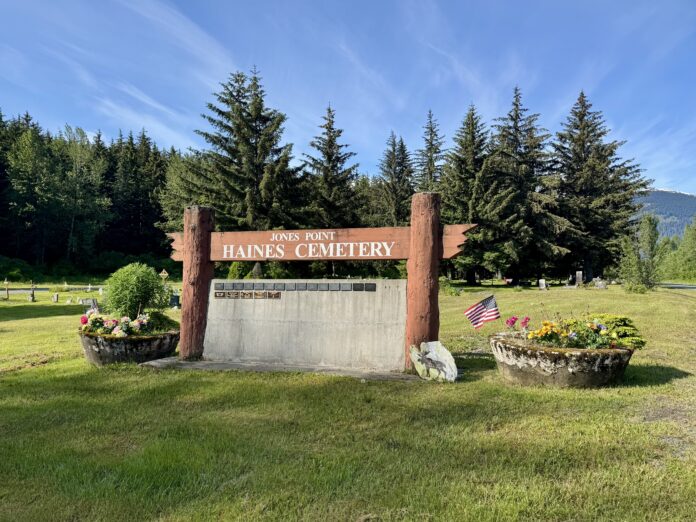The Haines Borough Assembly voted 4-2 on Tuesday to deny an easement request by the Takshanuk Watershed Council that would have allowed the environmental nonprofit to build infrastructure across Jones Point Cemetery, the only cemetery in Haines. The decision followed two hours of public testimony and capped weeks of mounting opposition from residents and tribal members.
The easement would have permitted the nonprofit to construct a 7-foot electrified wildlife barrier and establish access across a portion of the cemetery property as part of its commercial composting operation. The project is located on an adjacent parcel, where TWC owns approximately 50 acres.
While composting has support in the community, the proposed encroachment on cemetery land drew resistance. Residents packed the Assembly chambers to voice concerns about the sanctity of the cemetery and the legality of using land protected by a 1922 deed, which limits it to burial-related purposes.
Opponents of the easement also highlighted that the compost facility was constructed before a land use permit was issued. TWC applied for an after-the-fact permit on Oct. 31, 2023, months after building the structure. Some residents expressed frustration that the nonprofit had not planned for the facility entirely on its own property, despite owning ample acreage.
The Assembly vote came after the Haines Planning Commission had recommended the easement by a 5-1 vote in June. That meeting drew about 90 minutes of public comment, nearly all opposed. Residents again turned out in large numbers Tuesday, with many people present who had rarely or never spoken at Assembly meetings.
In the hours leading up to the Assembly meeting, the Central Council of Tlingit and Haida Indian Tribes of Alaska sent a two-page letter opposing the easement. The letter noted that the nonprofit also encroaches with its trails on an adjacent Native allotment and raised objections to TWC’s use of cemetery land. The Tlingit and Haida Central Council’s opposition was especially significant, as it had provided funding to TWC, including for this composting facility. The Tlingit and Haida money given to the composting project originated from the US Department of Agriculture.
Those who supported the easement argued that composting serves an environmental good, and some downplayed the permit deficit issues as simple mistakes. But several community members spoke passionately in defense of the cemetery, pushing back against the influence of well-organized, heavily funded nonprofits in local decision-making.
Assembly members Craig Loomis and Kevin Forster cast the two dissenting votes against the motion to deny the easement.
Assembly members thanked the cemetery caretakers for their selfless dedication to the care and maintaining of the cemetery and for taking care of final arrangements with family members of the departed for the last 37 years. They also apologized for the city and borough’s failure to prioritize cemetery needs throughout the years.
For now, the cemetery land remains protected from being traipsed through by people on their way to add coffee grounds, banana peels, and eggshells to the community compost.
